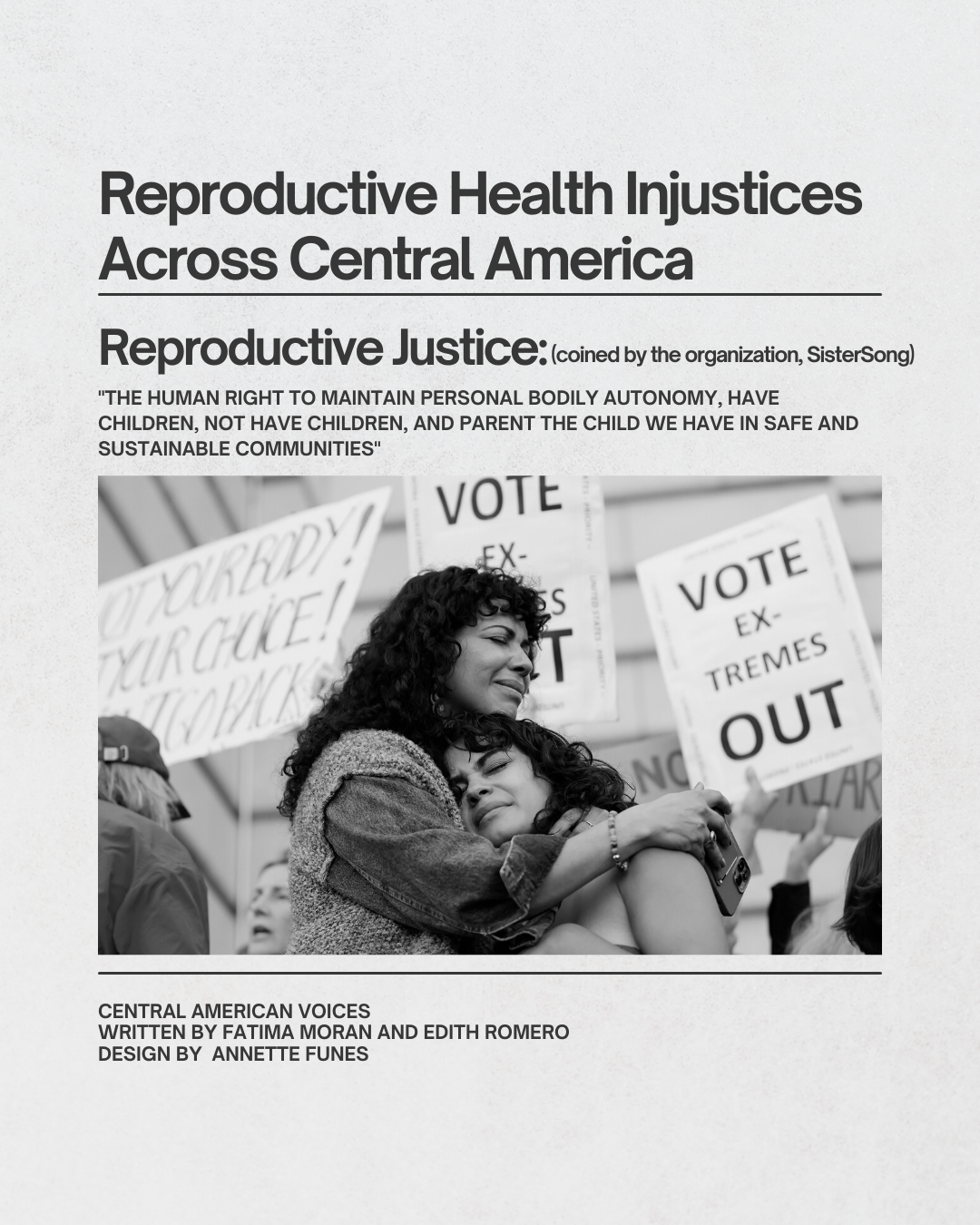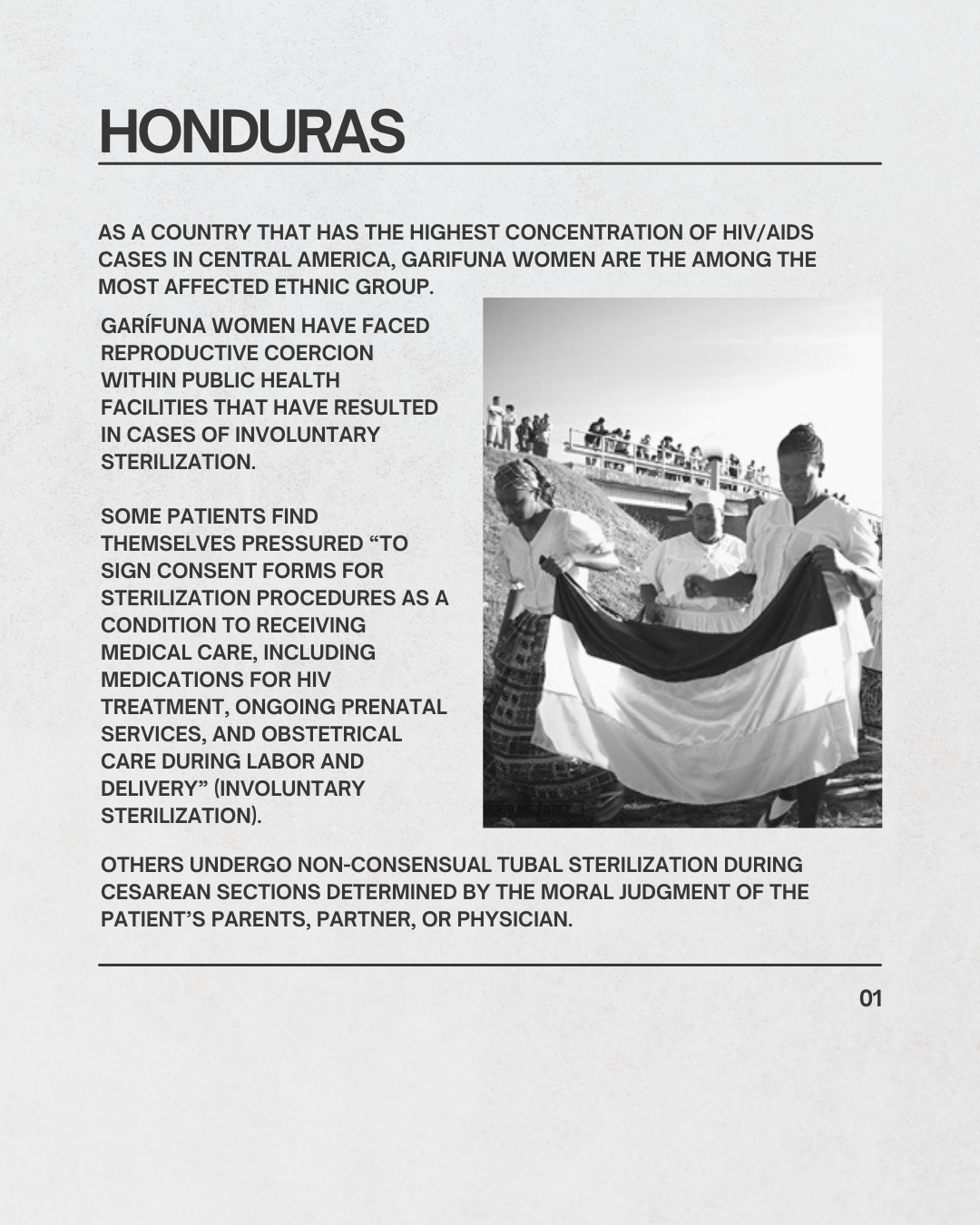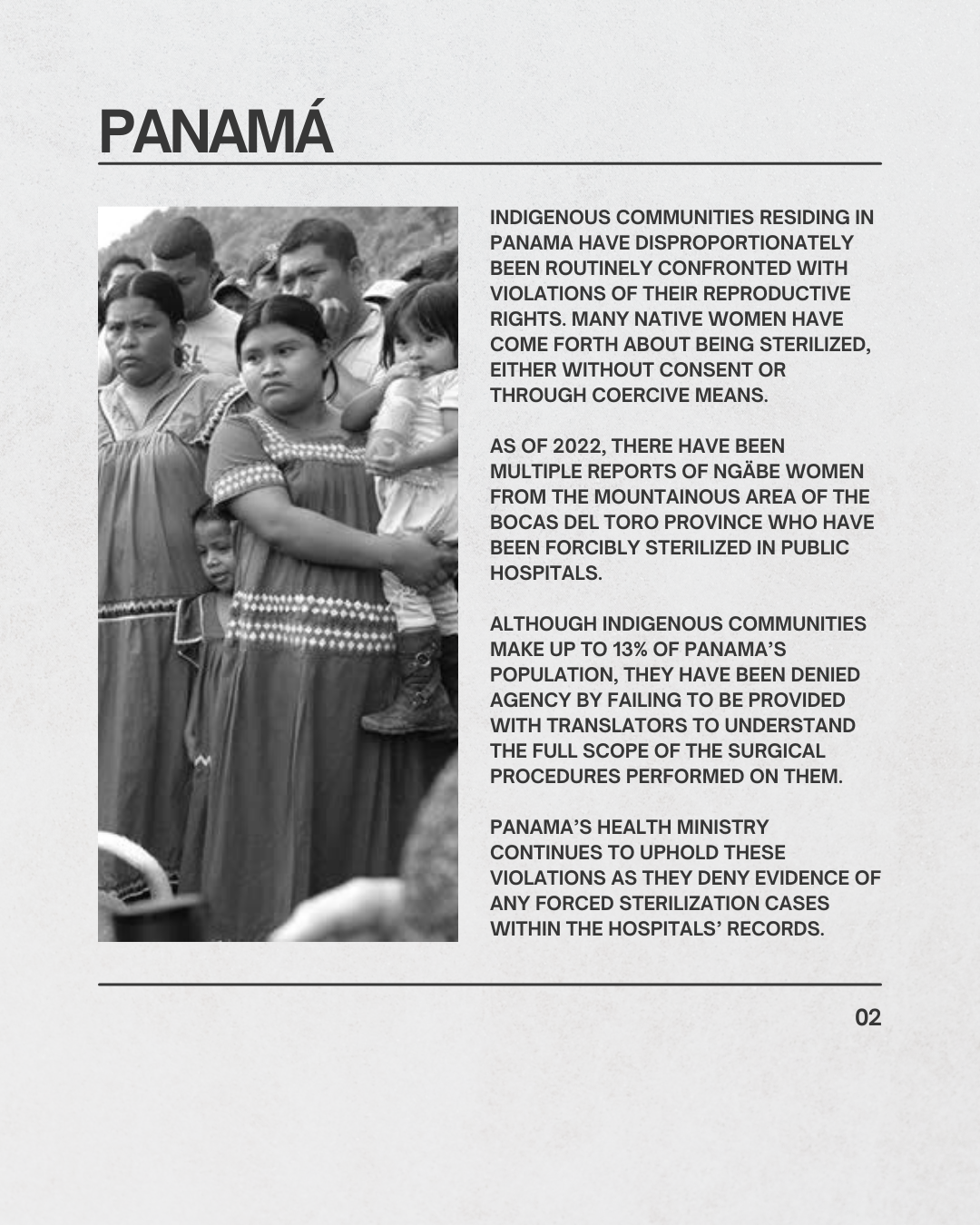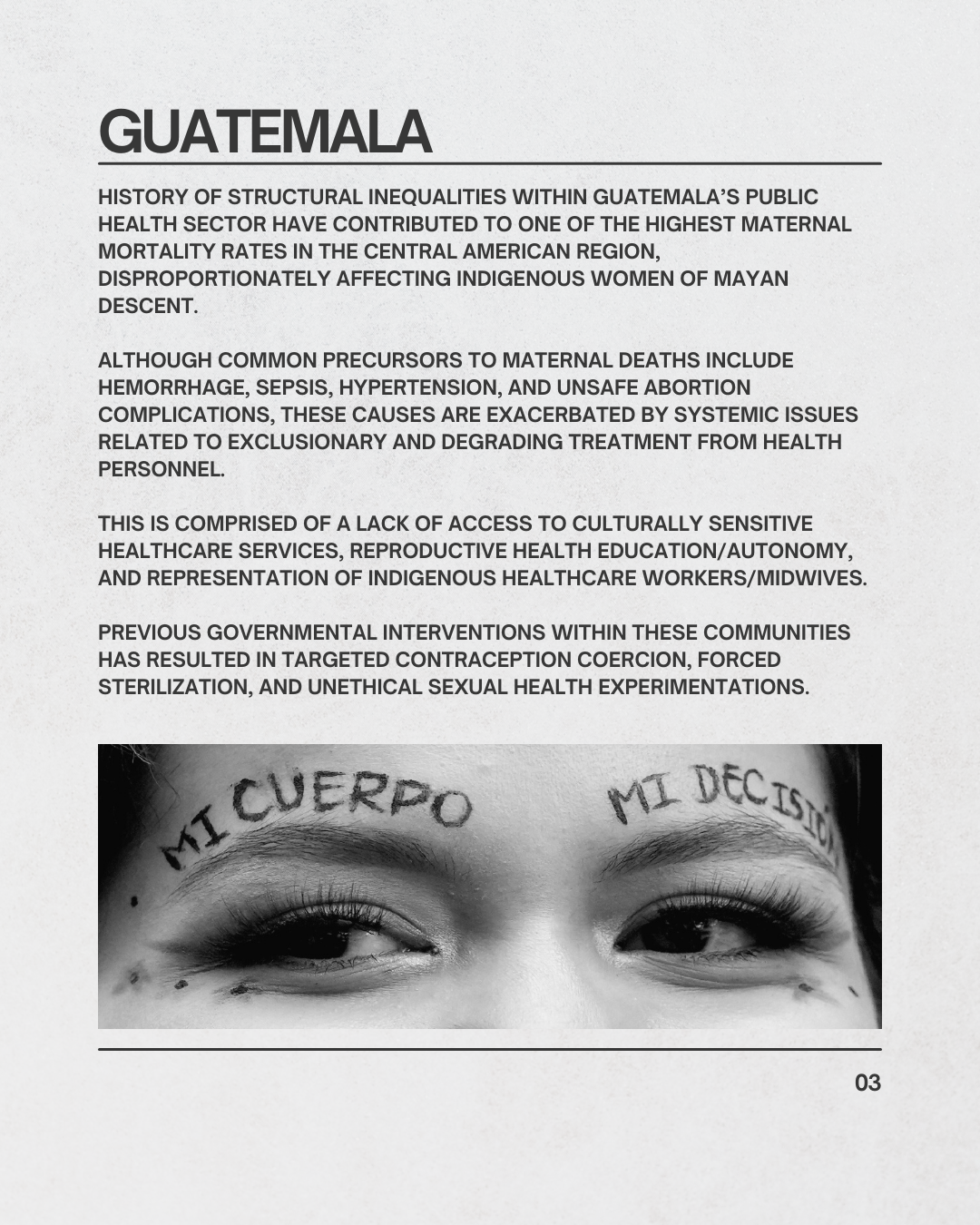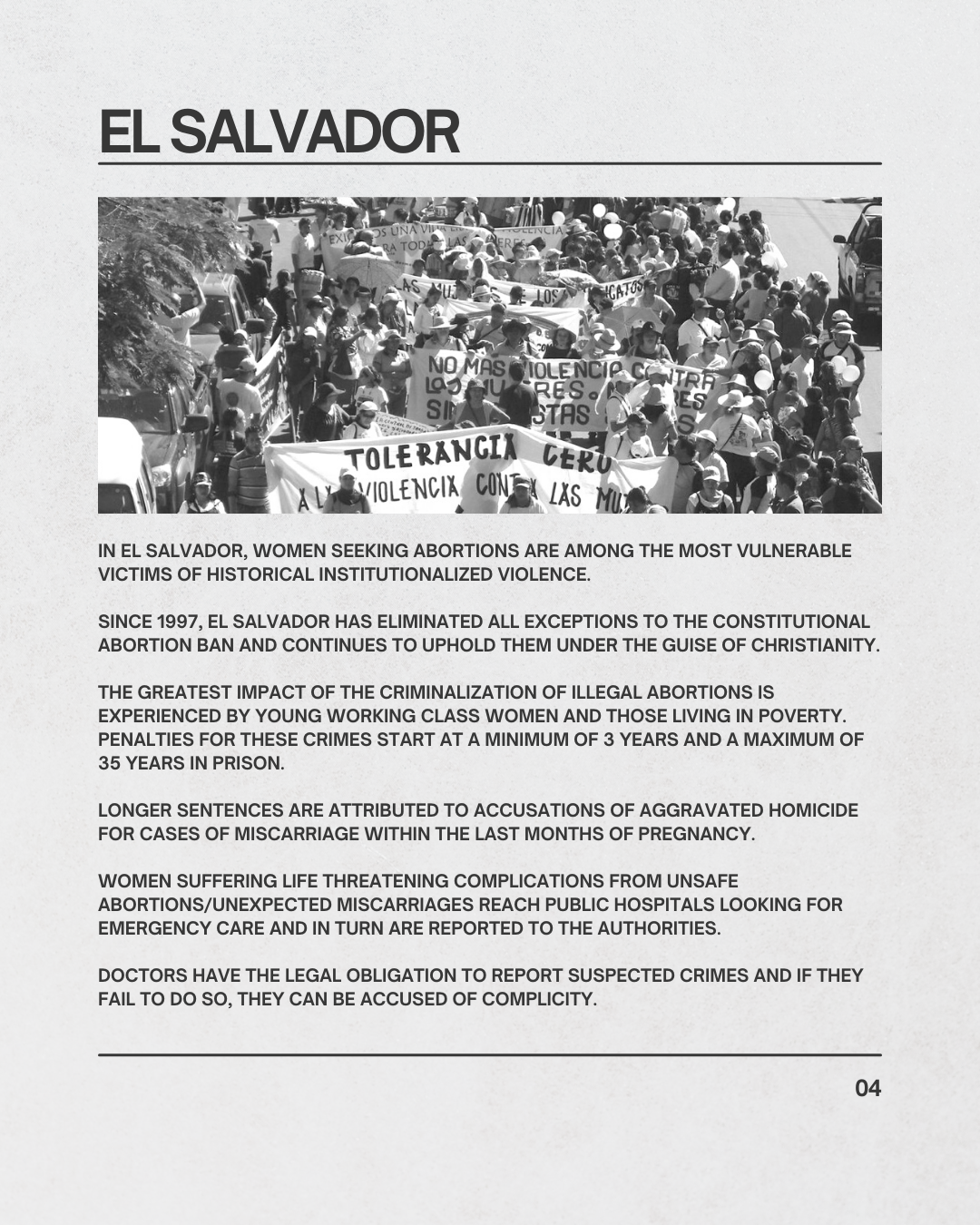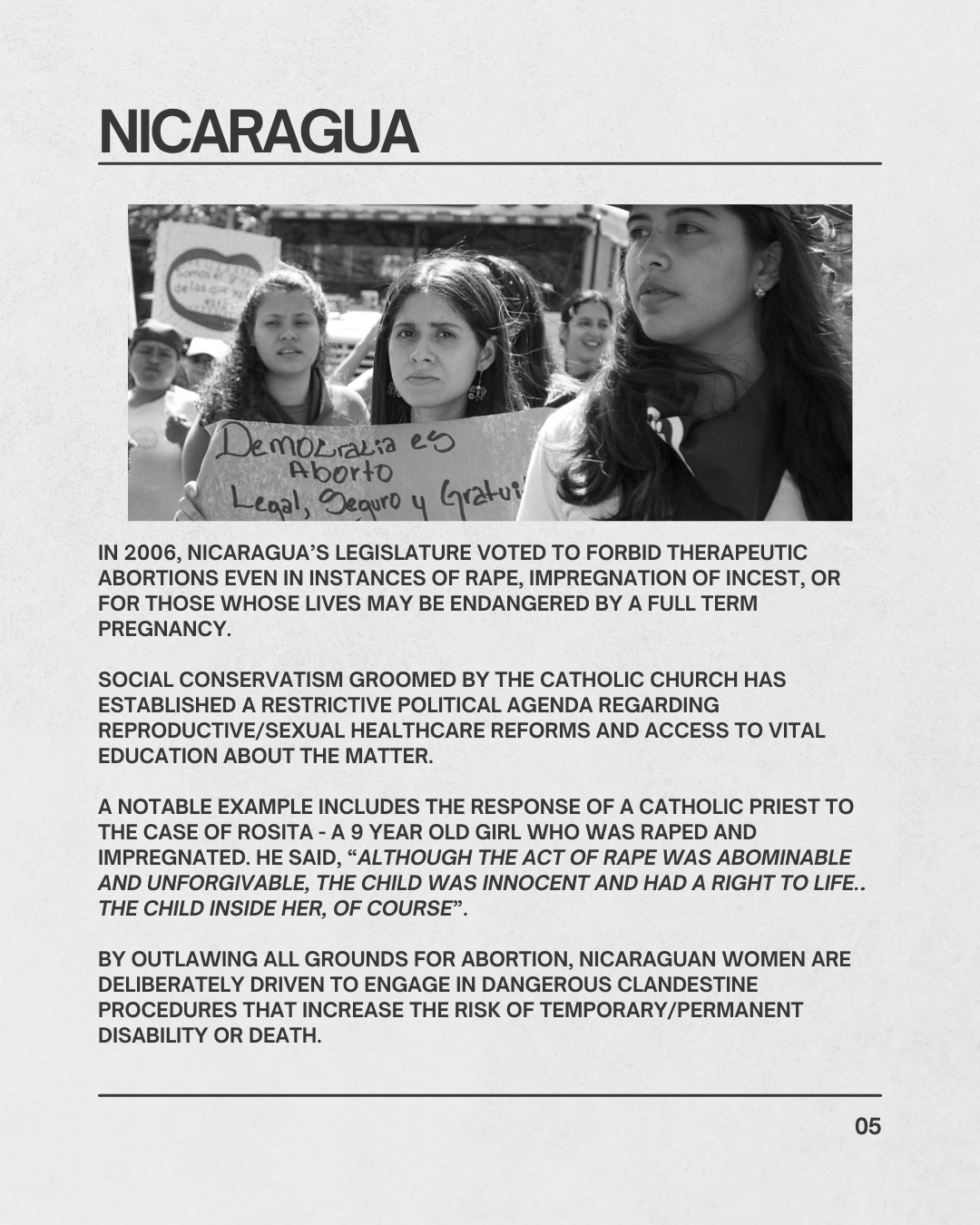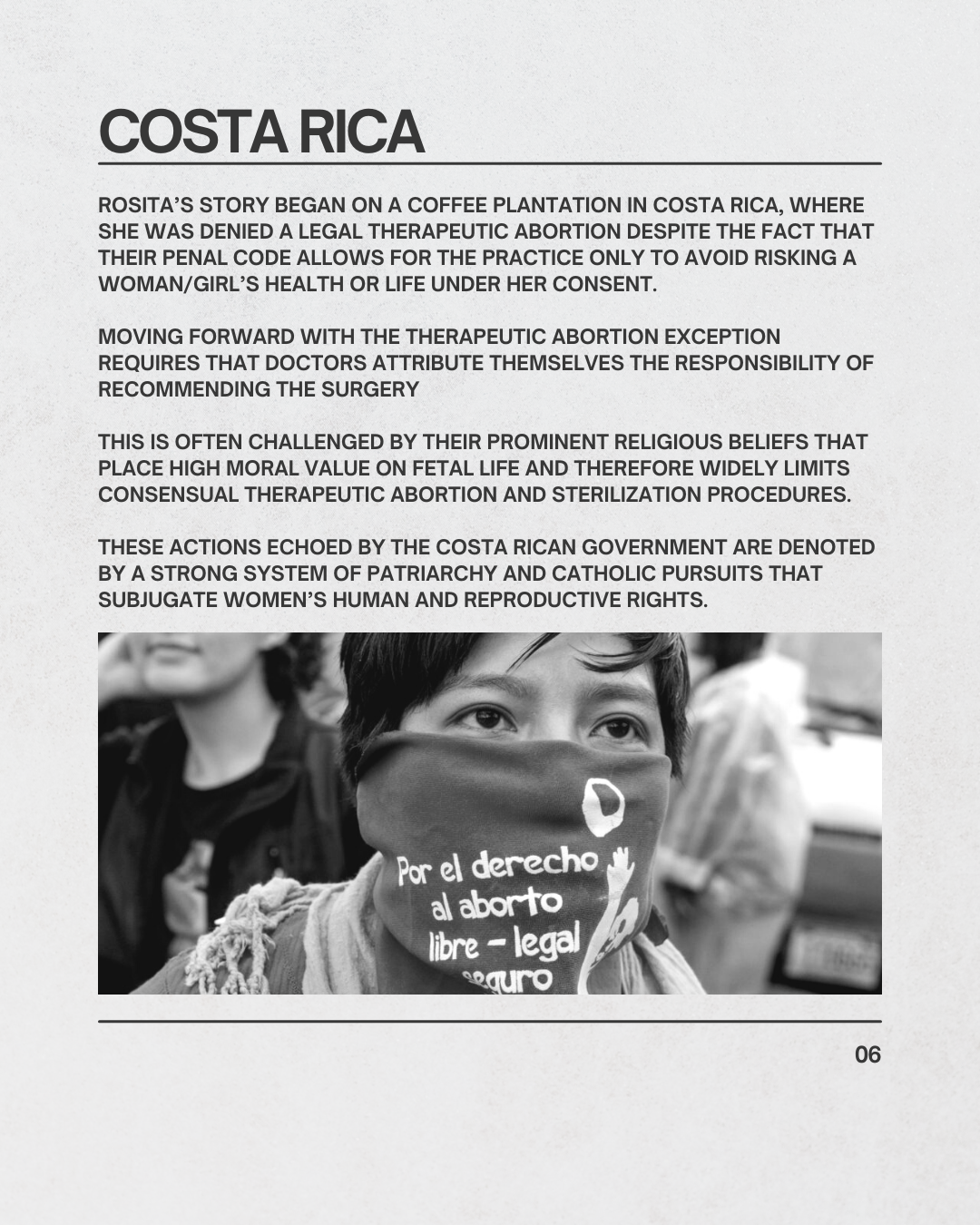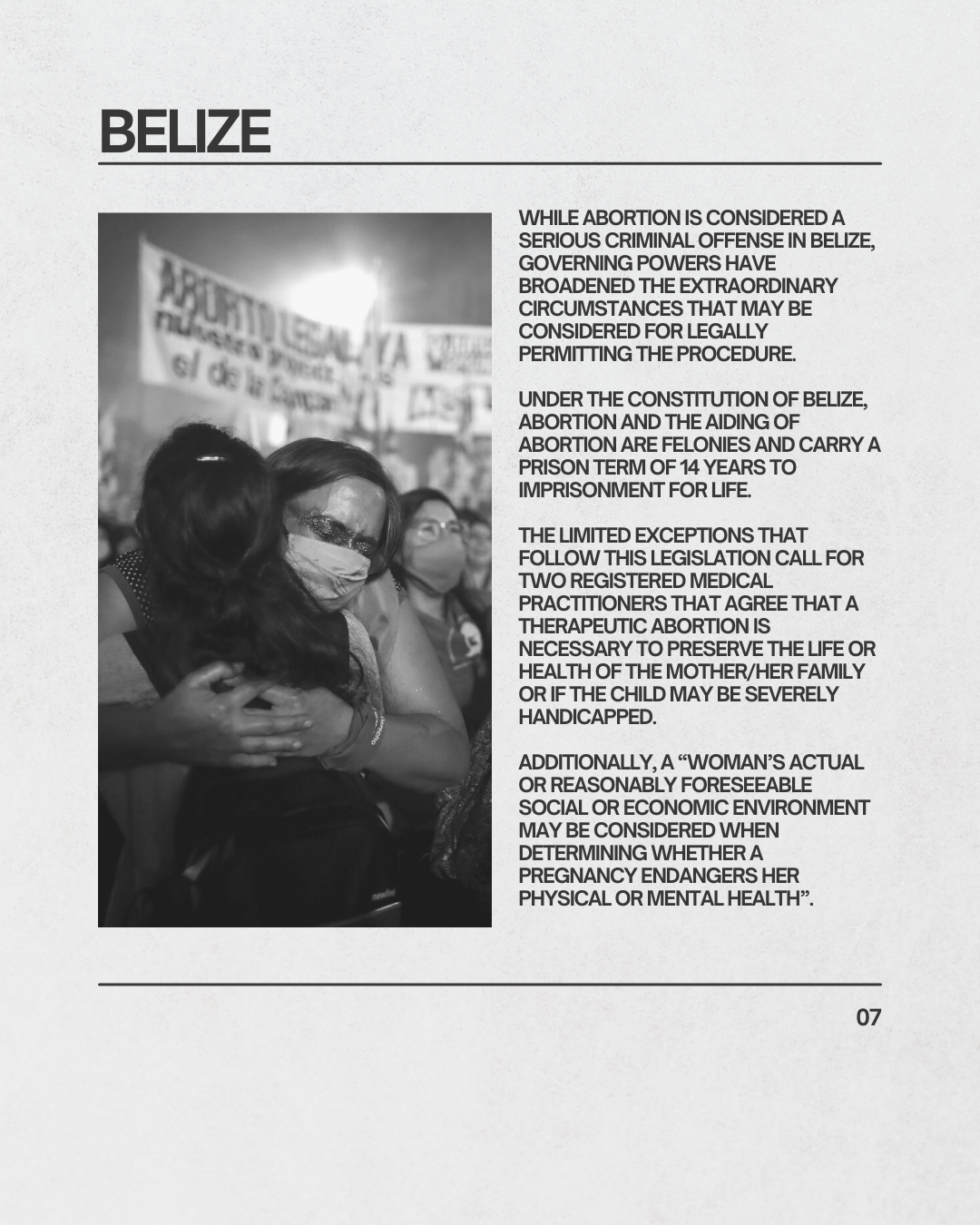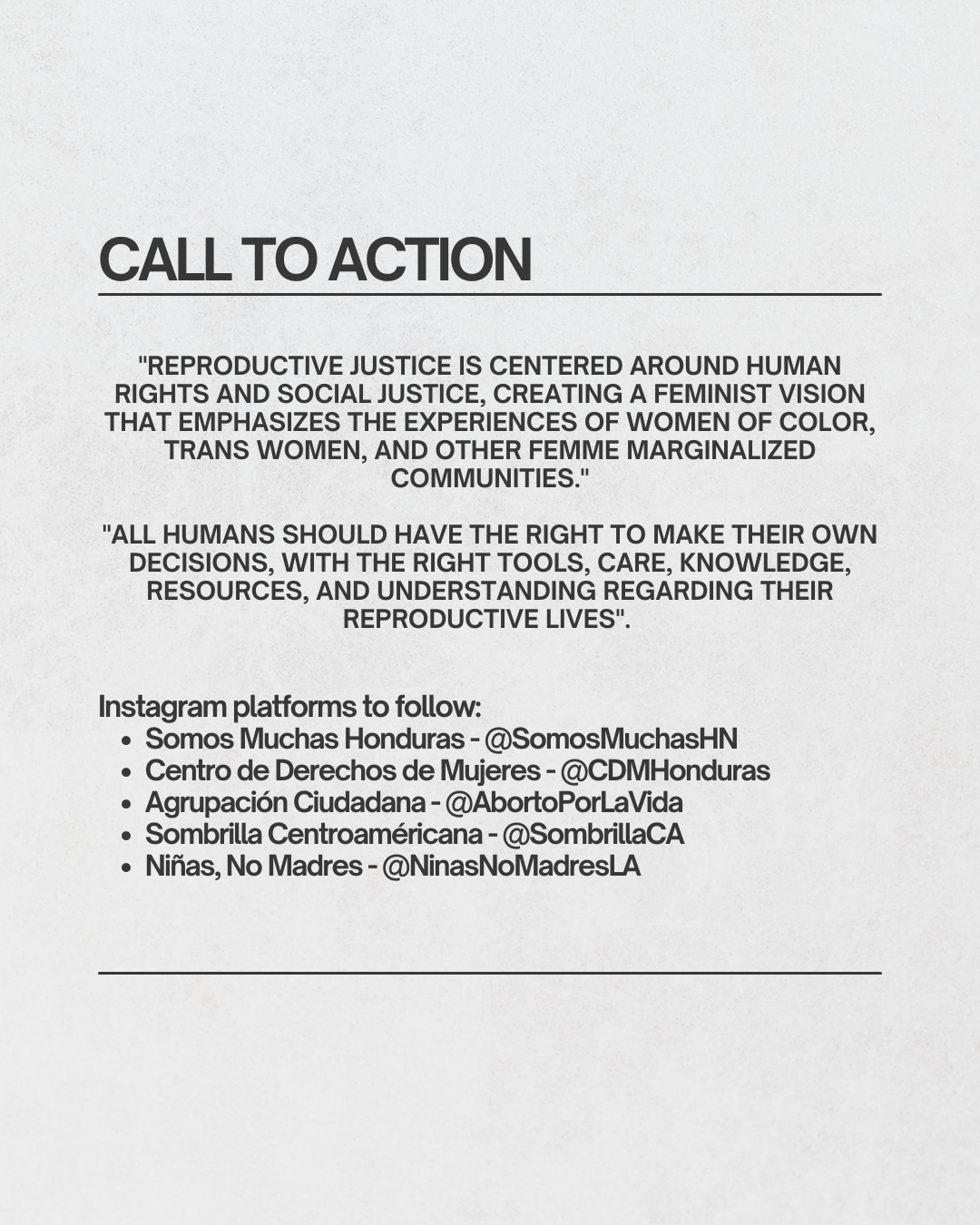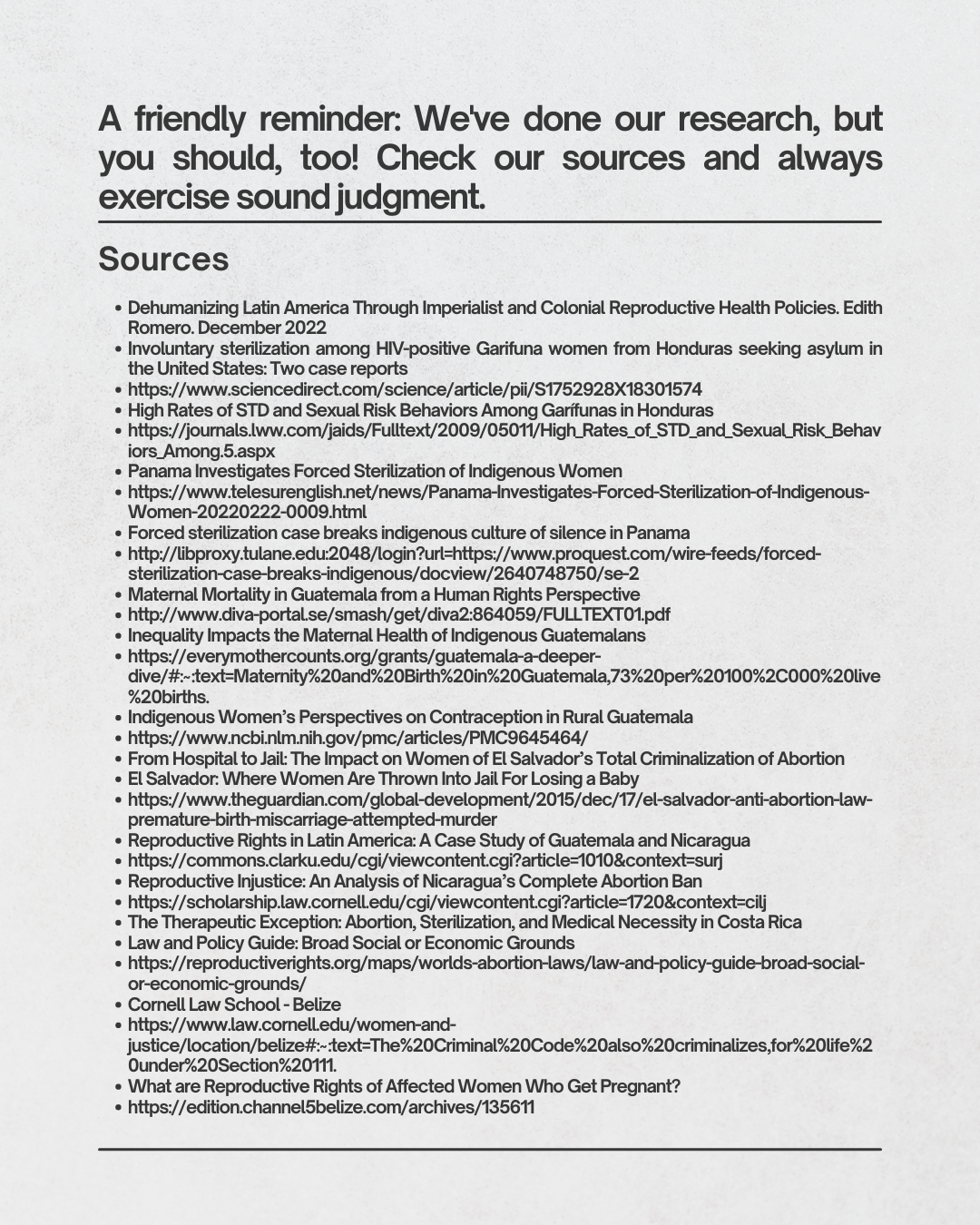Reproductive Health Injustices Across Central America
Researcher & Writer: Fatima Moran & Edith Romero
Editor: Maya Garcia & Jocelyn Monroy-Saavedra
Graphics: Annette Funes
Reproductive Justice was a term coined by the organization SisterSong which defined it as
“the human right to maintain personal bodily autonomy, have children, not have children, and parent the children we have in safe and sustainable communities”
Reproductive Justice is centered around human rights and social justice, creating a feminist vision that emphasizes the experiences of women of color, trans women, and people of marginalized genders.
All humans should have the right to make their own decisions, with the right tools, care, knowledge, resources, and understanding regarding their reproductive lives.
Honduras
In Honduras, numerous HIV-positive Garífuna women have faced reproductive coercion within public health facilities that have resulted in cases of involuntary sterilization.
Several investigations acknowledge the multifaceted forms of discrimination that HIV-positive Garífuna women endure as a result of pervasive stigma from physicians and the greater society. Some patients find themselves pressured “to sign consent forms for sterilization procedures as a condition to receiving medical care, including medications for HIV treatment, ongoing prenatal services, and obstetrical care during labor and delivery” (Involuntary Sterilization). Others undergo non-consensual tubal sterilization during cesarean sections determined by the moral judgment of the patient’s parents, partner, or physician.
As a country that has the highest concentration of HIV/AIDS cases in Central America, the Garífuna women are among the most affected ethnic group (High Rates). These practices of involuntary sterilization are used as a means of population control for marginalized communities and are direct abuses of a number of fundamental human rights.
Panama
Indigenous communities residing in Panama have disproportionately been routinely confronted with violations of their reproductive rights. Many Native women have come forth about being sterilized, either without consent or through coercive means.
As of 2022, there have been multiple reports of Ngäbe women from the mountainous area of the Bocas del Toro province who have been forcibly sterilized in public hospitals. Patterns have indicated that women who had given “birth in the Changuinola and Almirante hospitals could not have children again” while other “young women were left sterile after having two or three children” (Panama Investigates). Although Indigenous communities make up to 13% of Panama’s population, they have been denied agency by failing to be provided with translators to understand the full scope of the surgical procedures performed on them.
Panama’s Health Ministry continues to uphold these violations as they deny the evidence of any forced sterilization cases within the hospitals’ records.
Guatemala
A history of structural inequalities within Guatemala’s public health sector has contributed to one of the highest maternal mortality rates in the Central American region, disproportionately affecting Indigenous women of Mayan descent.
Although common precursors to maternal deaths include hemorrhage, sepsis, hypertension, and unsafe abortion complications, these causes are exacerbated by systemic issues related to exclusionary and degrading treatment from health personnel (Maternal Mortality). This includes a lack of access to culturally sensitive healthcare services, reproductive health education/autonomy, and representation of Indigenous healthcare workers/midwives.
Previous governmental interventions within these communities have resulted in targeted contraception coercion, forced sterilization, and unethical sexual health experimentations (Inequality Impacts).
El Salvador
In El Salvador, women seeking abortions are among the most vulnerable victims of historical institutionalized violence. Since 1997, El Salvador has eliminated all exceptions to the constitutional abortion ban and continues to uphold them due to strong Christian values.
The greatest impact of the criminalization of illegal abortions is experienced by young working-class women and those living in poverty. Penalties for these crimes start at a minimum of 3 years and a maximum of 35 years in prison (From Hospital). The longer sentences are attributed to accusations of aggravated homicide for cases of miscarriage within the last months of pregnancy. Women suffering life-threatening complications from unsafe abortions/unexpected miscarriages reach public hospitals looking for emergency care and in turn, are reported to the authorities. Doctors have the legal obligation to report suspected crimes and if they fail to do so, they can be accused of complicity (El Salvador).
The recurring oppressive circumstances that Salvadoran women are forced into by the government and the society at large are a developed execution of human rights abuses.
Nicaragua
Nicaragua follows closely behind El Salvador’s supremely restrictive abortion bans. In 2006, Nicaragua’s legislature voted to forbid therapeutic abortions which are those abortions before the 20th week of gestation because it endangers the mother’s life or health. The legislation forbids them even in instances of rape, impregnation of incest, or for those whose lives may be endangered by a full-term pregnancy (Reproductive Rights).
Social conservatism groomed by the Catholic Church has established a restrictive political agenda regarding reproductive/sexual healthcare reforms and access to vital education about the matter. A notable example includes the response of a Catholic priest to the case of Rosita - a 9-year-old girl who was raped and impregnated. He said, “Although the act of rape was abominable and unforgivable, the child was innocent and had a right to life…the child inside her, of course” (Reproductive Injustice).
By outlawing all grounds for abortion, Nicaraguan women are deliberately driven to engage in dangerous clandestine procedures that increase the risk of temporary/permanent disability or death.
Costa Rica
Rosita’s story began on a coffee plantation in Costa Rica, where she was denied a legal therapeutic abortion despite the fact that their Penal Code allows for the practice only to avoid risking a woman/girl’s health or life under her consent.
Moving forward with the therapeutic abortion exception requires that doctors attribute themselves to the responsibility of recommending the surgery (The Therapeutic). This is often challenged by their prominent religious beliefs that place high moral value on fetal life and therefore widely limits consensual therapeutic abortion and sterilization procedures.
These actions echoed by the Costa Rican government are denoted by a strong system of patriarchy and Catholic pursuits that subjugate women’s human and reproductive rights.
Belize
While abortion is considered a serious criminal offense in Belize, governing powers have broadened the extraordinary circumstances that may be considered for legally permitting the procedure.
Under the Constitution of Belize, abortion and the aiding of abortion are felonies and carry a prison term of 14 years to imprisonment for life. The limited exceptions that follow this legislation call for two registered medical practitioners that agree that therapeutic abortion is necessary to preserve the life or health of the mother/her family or if the child may be severely handicapped (Cornell Law). Additionally, a “woman’s actual or reasonably foreseeable social or economic environment may be considered when determining whether a pregnancy endangers her physical or mental health” (Law and Policy).
Call to Action
“Reproductive Justice is centered around human rights and social justice, creating a feminist vision that emphasizes the experiences of women of color, trans women, and other femme marginalized communities. All humans should have the right to make their own decisions, with the right tools, care, knowledge, resources, and understanding regarding their reproductive lives”Edith Romero
Instagram platforms to follow:
Sources:
Dehumanizing Latin America Through Imperialist and Colonial Reproductive Health Policies. Edith Romero. December 2022
Involuntary sterilization among HIV-positive Garifuna women from Honduras seeking asylum in the United States: Two case reports
High Rates of STD and Sexual Risk Behaviors Among Garífunas in Honduras
Panama Investigates Forced Sterilization of Indigenous Women
Forced sterilization case breaks indigenous culture of silence in Panama
Maternal Mortality in Guatemala from a Human Rights Perspective
Inequality Impacts the Maternal Health of Indigenous Guatemalans
Indigenous Women’s Perspectives on Contraception in Rural Guatemala
From Hospital to Jail: The Impact on Women of El Salvador’s Total Criminalization of Abortion (PDF FROM EDITH, DON’T HAVE A LINK)
El Salvador: Where Women Are Thrown Into Jail For Losing a Baby
Reproductive Rights in Latin America: A Case Study of Guatemala and Nicaragua
Reproductive Injustice: An Analysis of Nicaragua’s Complete Abortion Ban
The Therapeutic Exception: Abortion, Sterilization, and Medical Necessity in Costa Rica (PDF FROM EDITH, DON’T HAVE A LINK)
Law and Policy Guide: Broad Social or Economic Grounds
Cornell Law School - Belize
What are Reproductive Rights of Affected Women Who Get Pregnant?
